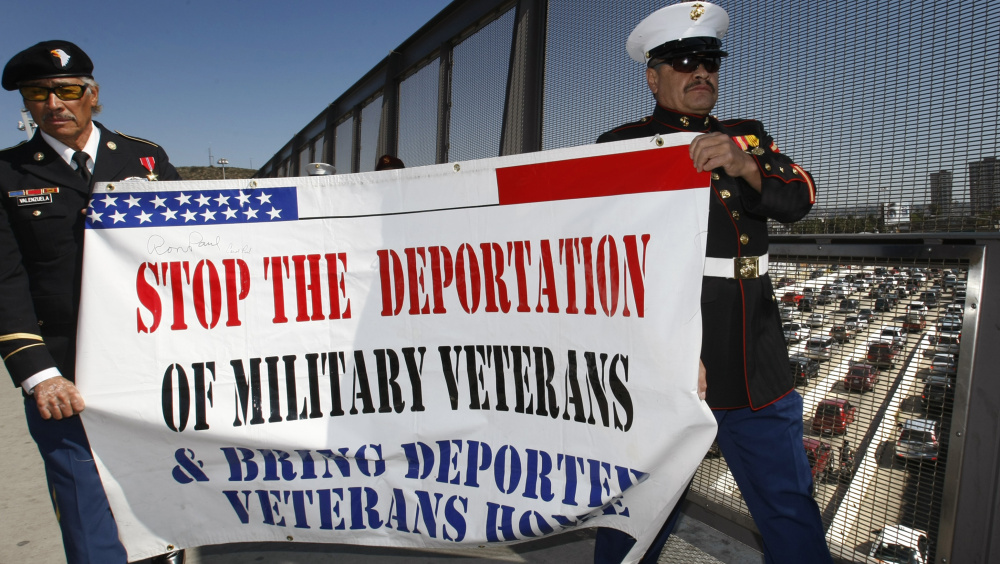CIUDAD JUAREZ, Mexico — When they pushed him off the prison bus into the swirling dust of the Mexican border, they gave him only one instruction: Run.
He watched the other inmates scamper in all directions across the line dividing Laredo, Texas, from Mexico. This is how it ends, he thought to himself, after three honorable years of service in the U.S. Navy and one serious run-in with the law, he was being set adrift in a deadly Mexican border town hundreds of miles from home.
So he ran.
Juan Valadez once embraced the Navy’s ideals: Be your best, serve with honor, protect your country. But because he was born in Mexico and taken to the U.S. as an infant, his pact with America when he joined the military came with a catch: If he ever was convicted of a felony, he would be deported.
The only legal way to return would be in a coffin — a final mercy the U.S. government grants veterans who die after deportation.
“They’ll take you back once it’s not no good to you anymore,” Valadez said.
For much of its wartime history, the U.S. has offered citizenship to noncitizens who enlisted in the military and completed boot camp. The practice was stopped after the Vietnam War, and then resumed a generation later by the Army in 2009, and by the Navy after that.
Valadez, 33, is one of the thousands who served in the years when naturalization wasn’t a part of boot camp graduation.
Advocates estimate there are now at least 2,000 U.S. veterans living in northern Mexico. U.S. Immigration and Customs Enforcement doesn’t keep track of how many veterans the government has deported.
In Mexico, Valadez said, his military training and fluent English have drawn the keenest interest from a powerful drug cartel. In a single day, he said, he could make what he earns in a month running the sushi restaurant he owns in downtown Juarez.
But he has a wife and young daughter now, and he resists picking up the phone.
Valadez said going to work for the cartel would not only be dangerous, but also a betrayal.
“I’m still an American, I’m still a sailor,” he said.
Valadez admitted that he could have done far more to secure a foothold in America.
After boot camp, when he was deployed south of Yemen, in the Gulf of Aden, he could have found someone on his ship who could naturalize him, as the law permits immigrants on active duty abroad. But he never did, and eventually forgot about it.
The modern path to naturalization is far easier, allowing boot camp graduates to participate in a naturalization ceremony.
A Pentagon report, issued in 2008 during two wars, estimated that about 8,000 noncitizens enlist in the military each year. It is unclear whether enlistment numbers have continued at that pace.
When Valadez returned from duty in the Gulf of Aden, he left the military and went looking for quick cash. He found it in marijuana.
He told a friend of a friend that he would take a shipment of marijuana from El Paso to Columbus, Ohio. He said he didn’t know it at the time, but he was working for the same cartel that would later ask about his services in Juarez. The scheme was a setup, Valadez said, and he was convicted of conspiracy to transport drugs, a felony.
He spent three years in prison but said his deportation to Mexico — a country that was all but foreign to him — was essentially a life sentence.
Still, it could be far worse.
On a recent afternoon, as the heat began to build, Valadez unhurriedly prepared the restaurant for opening. With his wife behind the register, he arranged cheap wooden circular tables and chairs into a pattern his servers could move around with ease.
On a busy commercial street in downtown Juarez, Valadez is a successful businessman. The restaurant is an achievement, a purchase he made after two years serving sushi from a food truck.
A half-dozen people, including dishwashers and waiters, rely on him to come to work every day, all the while resisting the pull of easy, dirty money.
“I was lucky. I had an uncle in Juarez,” he said. “Some people, they just disappear.”
Send questions/comments to the editors.


